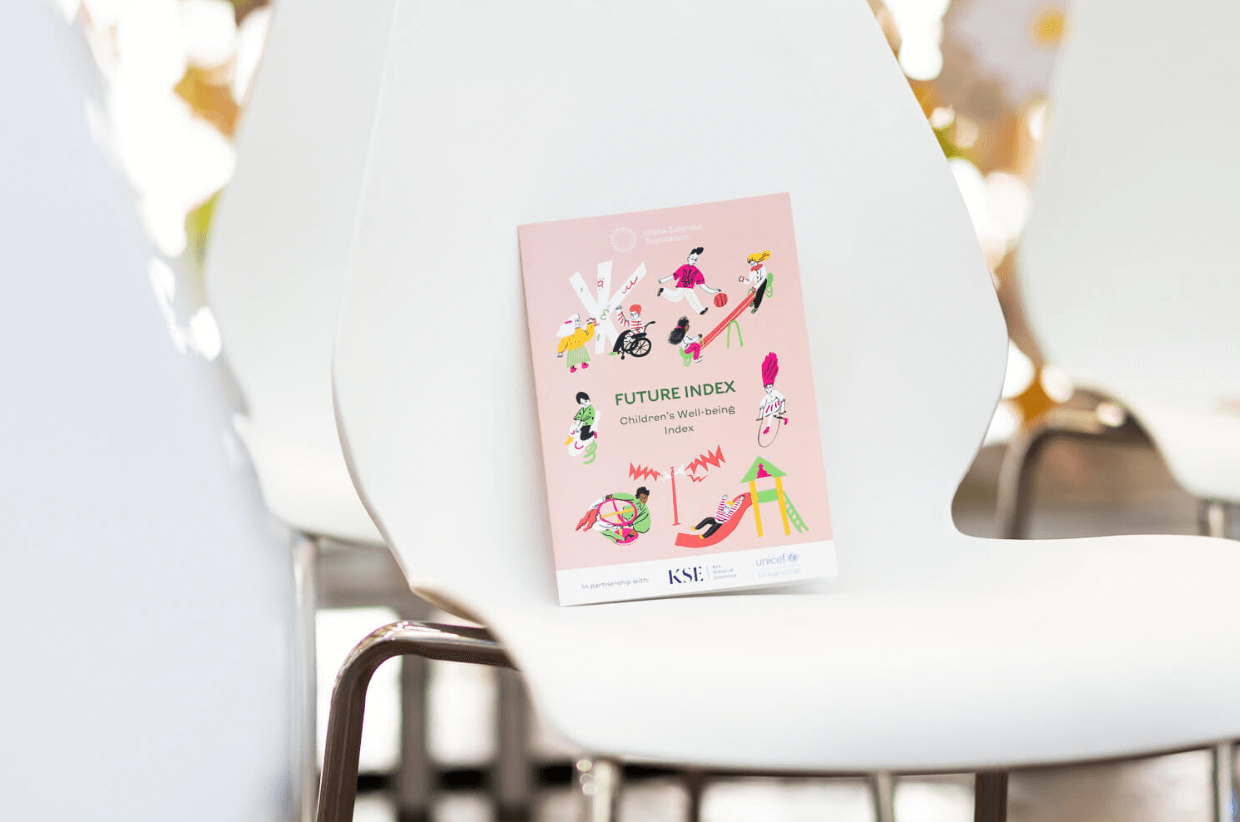- Kyiv School of Economics
- The Future Index (Child Well-Being Index)
The Future Index (Child Well-Being Index)

At the initiative of the Olena Zelenska Foundation, together with the Center for Sociological Research Decentralization and Regional Development KSE Institute and with the support of the United Nations Children’s Fund (UNICEF), the Future Index was conducted in Ukraine.
The methodology of the Index allows for a comprehensive assessment of the current situation with the well-being of children in Ukraine. The results of the pilot study will be used to further develop targeted recommendations and implement measures aimed at improving the well-being of Ukrainian children now and in the future.
The study assessed children’s well-being in 9 areas: education, health, safety, material security, mental health, social skills, risky behavior, relationships with family and friends, and the institutional care system. The study used both statistical data and surveys of children, including more than 1,300 children aged 10 to 17 across Ukraine (except for the temporarily occupied territories). Interviews were also conducted with experts and graduates of institutional care facilities.
According to the results of the study, the Future Index in Ukraine is currently 0.64 (the index is a value with a range of values from 0 to 1, where a higher value indicates a better situation). The worst situation for children’s well-being is in the areas of health, education and institutional care.
Key findings of the pilot study:
Institutional care
In Ukraine, there are twice as many children in institutional care as in the European Union (per 100,000 children).
Children raised in institutions receive only formal care. Instead, they face the formality of care, cases of violence against them, lack of confidentiality, lack of choice and independence, etc. This is evidenced by in-depth interviews with graduates of residential institutions. Therefore, after leaving the state care system, children do not have basic skills of independence, are unable to solve problems or trust, and feel lonely.
Education
In Ukraine, 24% of children study exclusively online, which is almost 1 million schoolchildren. Half of parents – 55% – rate the conditions for their children’s distance learning as “very good or good.” However, parents of children from the east of the country were more likely to report poor conditions (22%) than those from other regions (14%).
Another conclusion of the pilot study is that the level of math knowledge is systematically lower than the level of Ukrainian and English language proficiency.
In addition, we have determined the share of children attending extracurricular activities. This is an important component of education, as it allows children to develop their all-round skills and talents. Only 69% of children have hobbies, but only 40% attend extracurricular activities.
Health
During the 2 years of full-scale war, the share of children vaccinated against diphtheria, tetanus and pertussis, as well as polio, decreased by 16% and 22%, respectively. According to experts, parents are less likely to vaccinate their children because stress and uncertainty make it harder for them to think about long-term things, as well as the loss of routine and the need to restore routine in places where children have moved. Some children were unable to get vaccinated because of the fighting.
Physical activity was one of the indicators used to assess health. 75% of the children surveyed were engaged in physical activity. However, girls were less likely to say they were physically active and less likely to feel full of energy.
Manifestations of risky behavior. Half of the children aged 14-17 have tried alcohol and cigarettes – 56% and 53% respectively. Drugs were tried by 3% of respondents. Systematically, at least once a week, 16% of children smoke, and 13% drink alcohol.
Safety
60% of children surveyed in Ukraine feel safe. Children from the south of the country feel the least safe – in 49% of cases.
40% of children face bullying at least once a month. Every week, 12% of children face bullying.
Mental health
Almost half of children in Ukraine – 44% of children – show signs of potential PTSD (post-traumatic stress disorder).
Overall, 71% of children consider themselves happy.
Social and emotional skills
86% of children show empathy: they are concerned about the feelings of other people. Children are also kind, able to share with others and help those in need. This dimension has the highest score of all.
Relationships in the family and with friends
73% of children have good family relationships, and 80% like to be at home with their families. At the same time, children with higher signs of potential PTSD are less likely to rate their family relationships positively.
86% of children have friends, but only 53% believe that friends can support them in difficult times.
General conclusions
The results of the pilot study show that the worst situation in children’s well-being is in three dimensions: “health”, “education” and “institutional care system”. The full-scale war, which has been going on for two years, has significantly worsened well-being indicators in a number of areas.
